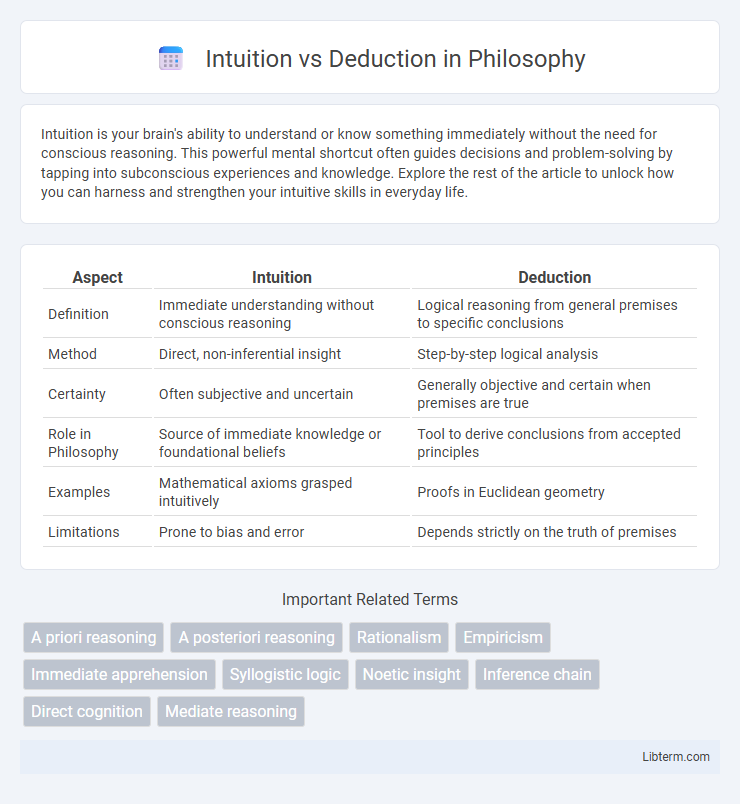Intuition is your brain's ability to understand or know something immediately without the need for conscious reasoning. This powerful mental shortcut often guides decisions and problem-solving by tapping into subconscious experiences and knowledge. Explore the rest of the article to unlock how you can harness and strengthen your intuitive skills in everyday life.
Table of Comparison
| Aspect | Intuition | Deduction |
|---|---|---|
| Definition | Immediate understanding without conscious reasoning | Logical reasoning from general premises to specific conclusions |
| Method | Direct, non-inferential insight | Step-by-step logical analysis |
| Certainty | Often subjective and uncertain | Generally objective and certain when premises are true |
| Role in Philosophy | Source of immediate knowledge or foundational beliefs | Tool to derive conclusions from accepted principles |
| Examples | Mathematical axioms grasped intuitively | Proofs in Euclidean geometry |
| Limitations | Prone to bias and error | Depends strictly on the truth of premises |
Understanding Intuition: The Power of Instinct
Understanding intuition involves recognizing it as an instinctive, rapid cognitive process that draws on subconscious pattern recognition and past experiences to generate insights without deliberate reasoning. Intuition operates through neural networks that integrate vast amounts of implicit knowledge, allowing individuals to make swift decisions in complex or ambiguous situations where explicit deduction may be slow or infeasible. Harnessing the power of instinct enhances problem-solving by complementing logical deduction, especially in environments requiring immediate judgment or creative innovation.
Deduction Defined: Reasoning from Facts
Deduction is a logical process that derives specific conclusions from general premises or established facts, ensuring conclusions are logically certain if the premises are true. This methodical reasoning relies on objective evidence and structured argumentation, making it essential in scientific and mathematical disciplines. Deduction contrasts with intuition by emphasizing verifiable data over instinctive judgment.
Key Differences Between Intuition and Deduction
Intuition relies on subconscious understanding and immediate insight without explicit reasoning, often driven by experience and internal cues. Deduction involves a logical, step-by-step process based on established premises to reach a valid conclusion, emphasizing clarity and systematic reasoning. Key differences include intuition's speed and ambiguity versus deduction's deliberate structure and verifiability.
When to Trust Your Intuition
Intuition is most reliable when decisions involve pattern recognition based on extensive experience, such as in creative fields or rapid problem-solving scenarios. Deduction excels in situations requiring logical analysis, clear evidence, and systematic reasoning, particularly in scientific research or complex troubleshooting. Trust your intuition when quick judgments align with past knowledge, but rely on deduction when accuracy and detailed validation are critical.
The Strengths of Deductive Reasoning
Deductive reasoning provides a clear and structured approach to problem-solving by applying general principles to specific cases, ensuring conclusions are logically certain when premises are true. It excels in fields like mathematics, law, and computer science where precision and consistency are paramount. This method reduces errors by relying on established facts and formal logic rather than subjective judgment or guesswork.
Intuition vs Deduction in Decision-Making
Intuition in decision-making relies on subconscious pattern recognition and experiential knowledge, enabling rapid judgments without extensive data analysis. Deduction involves a logical, step-by-step process that systematically evaluates evidence and applies formal reasoning to arrive at conclusions. Effective decision-making often balances intuition's speed with deduction's rigor to optimize outcomes in complex situations.
Cognitive Bias and Its Impact on Intuition
Cognitive bias significantly influences intuition by distorting perception and judgment, often leading to flawed decision-making processes. Confirmation bias, availability heuristic, and overconfidence skew intuitive insights, causing reliance on incomplete or misleading information. Understanding these biases is essential for refining intuitive thinking and enhancing the accuracy of rapid cognitive assessments.
The Role of Experience in Shaping Intuition
Experience plays a crucial role in shaping intuition by providing a rich database of patterns and outcomes that the brain subconsciously processes. This accumulated knowledge allows intuitive judgments to emerge quickly without conscious reasoning, often leading to accurate insights in complex or uncertain situations. In contrast, deduction relies on explicit logical reasoning and step-by-step analysis, which can be slower but more verifiable.
Balancing Intuition and Deduction for Better Outcomes
Balancing intuition and deduction enhances decision-making by combining instinctive insights with logical analysis, leading to more comprehensive outcomes. Intuition offers quick, experience-based judgments, while deduction provides systematic evidence evaluation and reasoning. Integrating both approaches allows for adaptive strategies that leverage creativity and critical thinking, improving problem-solving effectiveness across diverse scenarios.
Practical Applications: Intuition and Deduction in Everyday Life
Intuition enables quick decision-making in everyday situations, such as recognizing patterns or assessing risks without extensive analysis, while deduction provides a structured approach to problem-solving through logical reasoning and evidence evaluation. In practical scenarios like medical diagnosis or financial planning, intuition helps generate hypotheses rapidly, and deduction validates them systematically to ensure accuracy. Combining intuition and deduction enhances decision quality by balancing speed with analytical rigor in diverse real-world contexts.
Intuition Infographic

 libterm.com
libterm.com